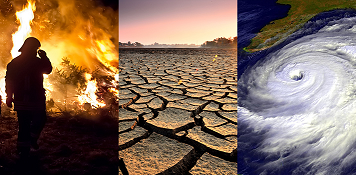The United Nations Climate Change panel (IPCC) has just published a major report on how to reduce the severity of climate change, Climate Change 2022: Mitigation of Climate Change [1].
- “The jury has reached a verdict … we are on a fast track to climate disaster” said the UN Secretary-General, Antonio Guterres [2].
The devastating effects of climate change are becoming clearer each year with news of floods, fires, hurricanes, and climate-induced famines. So the need for this report has never been greater.
The climate crisis has been compared to a house on fire [3].
Will the report finally motivate governments and individuals to do what they can to extinguish the flames?
Food production is a major contributor to global warming through its carbon emissions. So the report identifies the role of diet as a primary tool in tackling the problem of climate change. In fact the problem cannot be fixed without significant change to diet.
The conclusion is that if anyone is serious about reducing their carbon footprint and their impact on the planet then they will move to a diet that is largely or wholly plant-based.
Other benefits are also highlighted such as those for biodiversity, water availability, and human health.
Here are some quotes from the report
- Studies demonstrate that a shift to diets rich in plant-based foods, particularly pulses, nuts, fruits and vegetables, such as vegetarian, pescatarian or vegan diets, could lead to substantial reduction of greenhouse gas emissions as compared to current dietary patterns in most industrialized countries, while also providing health benefits and reducing mortality from diet-related non-communicable diseases
- Pulses such as beans, chickpeas, or lentils, have a protein composition complementary to cereals, providing together all essential amino acids.
- Soy beans, in particular, have a well-balanced amino acid profile with high bio-availability
A vegan diet is a very effective way to lower a carbon footprint. The extent of the benefit obviously depends on the individual lifestyle, but the report shows mitigation potentials of 0.4-2.1 tCO2-eq per capita for a vegan diet. This is likely to be a very significant percentage of an individual footprint and, unlike many other steps, can be taken up immediately
The Executive Summary grouped ways of changing our environmental impact into three areas : Avoid, Improve, Shift, eg Avoid flying, Improve Building methods. Interestingly, “The greatest Shift potential would come from switching to plant-based diets”.
The section on Greenhouse Gas Emissions (GHG) which are fuelling the climate fire, again highlights the benefit of a plant-based diet:
- GHG emissions, considering the full supply-chain, are generally highest for ruminant meat, cheese, and certain crustacean species (e.g., farmed shrimp and prawns, trawled lobster). Generally, beef from dairy systems has a lower footprint than beef from beef herds. Plant-based foods generally have lower GHG emissions (-2.2–4.5 kgCO2-eq per 100g protein) than farmed animal based foods
- Reduced consumption of animal-based foods, particularly from ruminant animals, could reduce pressure on forests and land used for feed, support the preservation of biodiversity and planetary health and contribute to preventing forms of malnutrition (i.e. undernutrition, micronutrient deficiency, and obesity) in developing countries
- Other co-benefits include lowering the risk of cardiovascular disease, type 2 diabetes, and reducing mortality from diet-related non-communicable diseases
The role of governments in encouraging plant-based diets is also noted:
Agricultural policies serve to support meat production with large subsidies that lower production cost and effectively increase the meat intensity of diets at a population level. Deeper, population wide reductions in meat consumption are hampered by these lock-in mechanisms which continue to stabilise the existing meat production-consumption system
The conclusion is that a wide take up of plant-based diets is essential to tackle climate change
But it will also be necessary to redirect the massive subsidies from the meat industry to plant-based agriculture
Although there are so many reasons to take up a plant-based diet, there is no suggestion that anyone should be compelled to change their diet. But if the findings of this report are seriously considered, it is clear that a wide take up of a plant-based diet is necessary for a better world
The UN Secretary-General, Antonio Guterres speaking about the report said
- Climate activists are sometimes depicted as dangerous radicals, but the truly dangerous radicals are the countries that are increasing the production of fossil fuels
On the consumption side, the logical conclusion is that the dangerous radicals are also those who are destroying the planet by their unsustainable consumption of meat, dairy and ocean life.
My conclusion from the report is that for the future of a sustainable, viable, healthy, just and equitable planet, the future must be plant-based. Starting today.
[1] https://www.ipcc.ch/report/sixth-assessment-report-working-group-3
[2] https://www.youtube.com/watch?v=P8rlLaT8v4Q
[3] https://www.theguardian.com/environment/2019/jan/25/our-house-is-on-fire-greta-thunberg16-urges-leaders-to-act-on-climate
